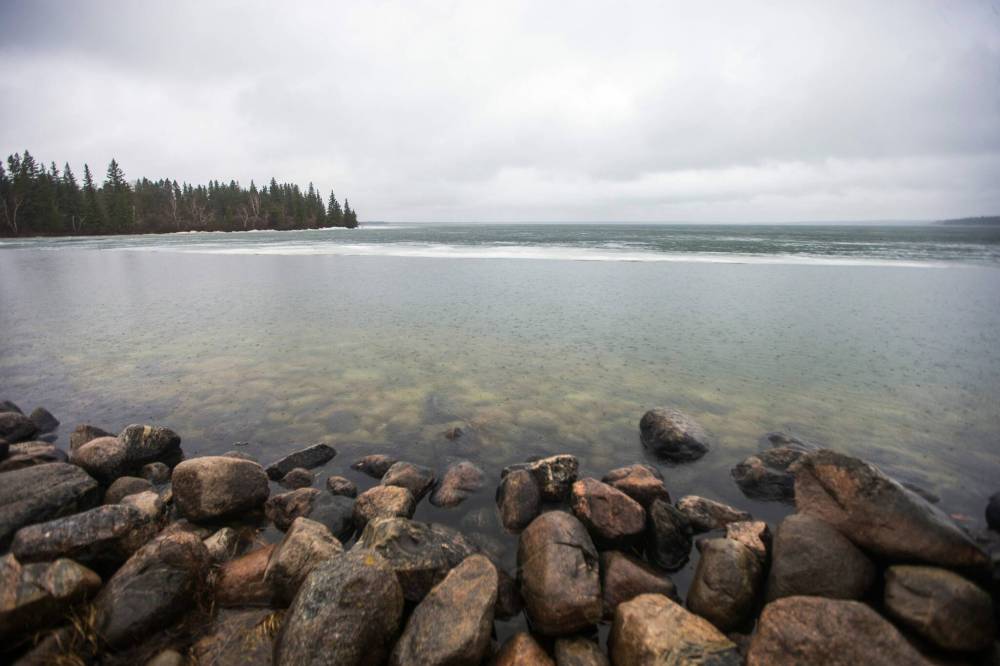Genetic traces of zebra mussels found in Clear Lake
Advertisement
Read this article for free:
or
Already have an account? Log in here »
To continue reading, please subscribe:
Monthly Digital Subscription
$0 for the first 4 weeks*
- Enjoy unlimited reading on winnipegfreepress.com
- Read the E-Edition, our digital replica newspaper
- Access News Break, our award-winning app
- Play interactive puzzles
*No charge for 4 weeks then price increases to the regular rate of $19.95 plus GST every four weeks. Offer available to new and qualified returning subscribers only. Cancel any time.
Monthly Digital Subscription
$4.99/week*
- Enjoy unlimited reading on winnipegfreepress.com
- Read the E-Edition, our digital replica newspaper
- Access News Break, our award-winning app
- Play interactive puzzles
*Billed as $19.95 plus GST every four weeks. Cancel any time.
To continue reading, please subscribe:
Add Free Press access to your Brandon Sun subscription for only an additional
$1 for the first 4 weeks*
*Your next subscription payment will increase by $1.00 and you will be charged $16.99 plus GST for four weeks. After four weeks, your payment will increase to $23.99 plus GST every four weeks.
Read unlimited articles for free today:
or
Already have an account? Log in here »
Hey there, time traveller!
This article was published 16/02/2023 (1057 days ago), so information in it may no longer be current.
Riding Mountain National Park staff are on high alert for invasive species in Clear Lake, after genetic traces of zebra mussels were found in a recent water sample.
The positive test result for environmental DNA of the mollusks came back Jan. 23, Parks Canada said Thursday. Zebra mussels themselves have not been found in the Manitoba park, and three subsequent tests for the DNA came back negative.
Regardless, tests will continue for a lengthy period of time. Similar situations have resulted in waters being tested for zebra mussel environmental DNA for years, Parks Canada resource conservation manager Borden Smid said.

MIKAELA MACKENZIE / WINNIPEG FREE PRESS FILES
Genetic traces of zebra mussels were found in a sample from Clear Lake in Riding Mountain National Park in January.
“It’s really the red flag that something’s going on here, and it’s not normal,” he said.
“(Environmental) DNA can just be DNA that’s washed off of a boat, and the fact that this is at our boat launch, we are cognizant that that’s the most likely spot we might be picking something like that. But we have to have some assurance that we don’t have zebra mussels present, at this point, so we can keep on testing negative.”
The park authority said the DNA does not pose a threat to the lake or its ecosystem but can serve as an early warning of invasive species.
Staff will conduct scientific monitoring on the ice of the lake beginning Monday, the authority said, and members will be diving in the water as part of the testing.
They will also construct a temporary laboratory building on the shore at the local boat cove, Parks Canada said.
Conversations will begin within the next few weeks with Keeseekoowenin Ojibway First Nation, business and tourism stakeholders, environmental NGOs and nearby municipalities on how the long-term testing process with proceed, officials said.
Parks Canada works with nearby Keeseekoowenin on the maintenance of Clear Lake. The First Nation has reserve land on its shores, and there are community members who harvest fish from it.
“We want to definitely have them by our side as we’re starting those conversations,” Riding Mountain National Park external relations manager Dameon Wall said.
Parks Canada is asking people to stay aware from the research and dive sites on Clear Lake, which is about 100 kilometres north of Brandon.
This is not the first time genetic traces of zebra mussels have been found in the national park.
Traces were flagged in Whirlpool Lake, about 15 km northeast of the Wasagaming town site, in December 2017. That lake and its campground were closed as a precautionary measure for all of 2018.
That doesn’t mean the two bodies of water will follow the same testing process, Smid said Thursday.
“It would be nearly impossible to implement something like that on the scale of Clear Lake (the park’s largest and most heavily trafficked) and the multitude of users — First Nations in the area having a right to use Clear Lake. So we’re not considering… a closure like that was done at Whirlpool Lake,” he said.
Whirlpool Lake is located along Highway 19 and east of Hwy. 10, which runs north-south through the park, located some 250 km northwest of Winnipeg.
Smid said the best way for boaters to do their part to prevent the spread of zebra mussels in Manitoba is the “clean, drain, dry” process: inspect and clean watercraft and any gear, drain any sitting water, and let them dry completely between trips.
“That’s our first line of defence in terms of controlling zebra mussels in this province,” he said.
malak.abas@freepress.mb.ca

Malak Abas is a city reporter at the Free Press. Born and raised in Winnipeg’s North End, she led the campus paper at the University of Manitoba before joining the Free Press in 2020. Read more about Malak.
Every piece of reporting Malak produces is reviewed by an editing team before it is posted online or published in print — part of the Free Press‘s tradition, since 1872, of producing reliable independent journalism. Read more about Free Press’s history and mandate, and learn how our newsroom operates.
Our newsroom depends on a growing audience of readers to power our journalism. If you are not a paid reader, please consider becoming a subscriber.
Our newsroom depends on its audience of readers to power our journalism. Thank you for your support.
History
Updated on Thursday, February 16, 2023 11:13 AM CST: Adds photo
Updated on Thursday, February 16, 2023 3:56 PM CST: Updates with final copy
Updated on Friday, February 17, 2023 7:47 AM CST: Corrects typo in headline


